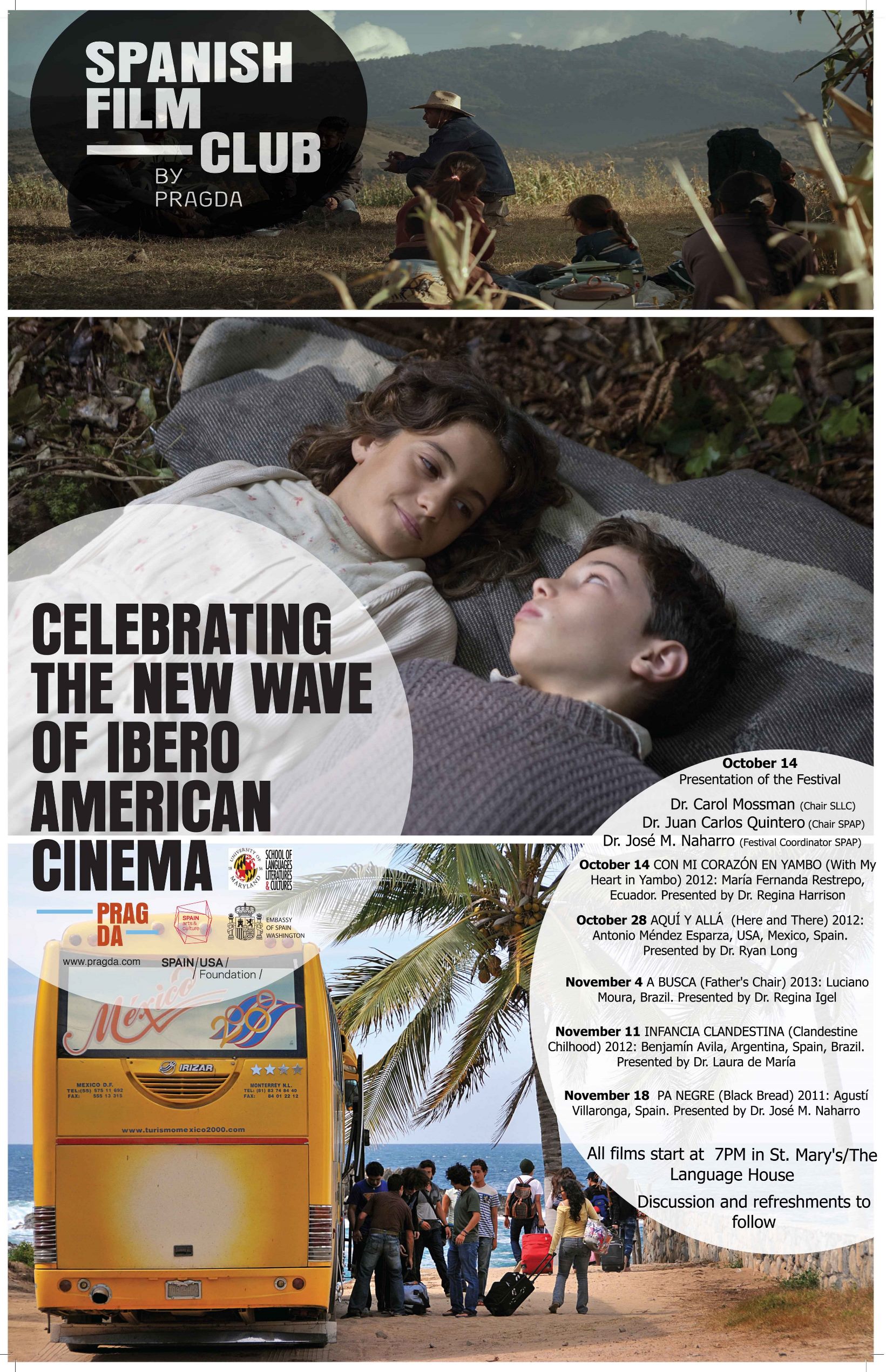PRAGDA FilmFest Now Underway
October 23, 2013

The festival opened with Con Mi Corazón en Yambo, a documentary on missing children in Ecuador.
The festival opened with Con Mi Corazón en Yambo, a documentary on missing children in Ecuador.
On October 14, the PRAGDA Film Festival: Celebrating the New Wave of Iberoamerican Cinema screened the first of five films slated for the fall 2013 semester. The festival—sponsored by the Government of Spain, School of Languages, Literatures and Cultures, and the Latin American Studies Center—runs mid-October through mid-November in the basement of St. Mary’s Hall and features five recent films from various locations in the Spanish and Portuguese-speaking world. The first was Con Mi Corazón en Yambo (“With My Heart in Yambo”), a documentary by María Fernanda Restrepo, whose two older brothers disappeared in 1988 at the hands of the Ecuadorian Police and were never seen again. Before the film began, the mixed audience of undergraduates, graduate students and professors heard remarks from the Director of SLLC, Dr. Carol Mossman; the Interim Director of LASC, Dr. Alejandro Cañeque; the Chair of Department of Spanish and Portuguese, Dr. Juan Carlos Quintero-Herencia; and the Grant Coordinator from the Department of Spanish and Portuguese, Dr. José María Naharro Calderón. Then, Dr. Regina Harrison, Professor of Spanish and Portuguese, whose scholarly work focuses on Ecuador, gave a brief presentation about the historical issues informing the documentary.
“It is a joy and sadness to speak about Ecuador,” Dr. Harrison said, referring to her experiences as a Peace Corps volunteer and visiting professor at the Universidad Andina Simón Bolívar in the capital city of Quito. Con Mi Corazón en Yambo “has a lot of resonance for Latin America,” said Harrison, explaining that the Restrepo family’s unflagging search for answers is “part of this long tradition of protest and, hopefully, recovery of memories” in the South American continent. “I won’t say, ‘enjoy’!” Harrison joked, but she urged participants to engage the storyline despite the somber subject matter.
Then the lights went dark, and Con Mi Corazón en Yambo lit up the screen with various shots of the Restrepo family home, including a close-up of the only photo that remains of the entire family together: director María Fernanda, her parents and her two older brothers. María Fernanda was ten years old on January 8, 1988, when Santiago, 18, and Andrés, 14, dropped off a friend at the airport and never returned. To this day, their whereabouts are unknown. Over the years, María Fernanda and her parents procured information from the Ecuadoran government that the brothers may have been detained, tortured and killed by the police, and that their bodies may have been dumped in Yambo, a lake about two hours south of Quito. But the family still has no answers for why the boys were held in the first place, and two searches of Lake Yambo, the most recent in 2009, have proved inconclusive. However, the Restrepos have pledged to keep searching for the bodies of Santiago and Andrés until they are found.
Among the many graduate students in the audience was María Cristina Monsalve, a second-year Ph.D. candidate in Spanish Language and Literature and the Spanish cluster language mentor in the Language House. Originally from Quito, Ecuador, Monsalve said Con Mi Corazón en Yambo brings memories of her childhood. “I remember the protests clearly,” she said: her mother used to work near the presidential palace, where crowds would congregate each Wednesday to demand answers from the government on the boys’ disappearance. She remembers how the faces of Santiago and Andrés were transformed into “iconic” symbols representing the country’s anguish over the Restrepo brothers’ status as desaparecidos—literally, “disappeared,” meaning one had been abducted and would never be set free. “It is a different category than alive or dead,” Monsalve explained, adding how, when she was young, to be “disappeared” struck her as a fate “worse than death.”
Many sequences in the film brought back strong memories for Monsalve, even details as seemingly insignificant as the clothes and hairstyles of Restrepo’s parents, as they reminded Monsalve of her own family during the same time period. “I recognize those details as being a little more emotive,” she said. She found Con Mi Corazón en Yambo to be a very effective film: “A documentary always implies a search, and the search becomes much more moving when it is not only based in the past, but on an introspection as well.”
2013 is the second consecutive year that the University of Maryland has hosted the PRAGDA Film Festival, after the Department of Spanish and Portuguese won a grant in the fall of 2012. The series will continue on October 28 at 7pm in the multipurpose room of St. Mary’s Hall with Aquí y Allá, a 2012 film by director Antonio Méndez Esparza, preceded with a presentation by Dr. Ryan Long, Associate Professor of Spanish and Portuguese. For a complete listing of upcoming films, visit the festival announcement on the department’s Web site.
Samantha Suplee ('14, Spanish Language & Literature and History)
SLLC Public Relations and Media Intern
ssuplee@umd.edu

